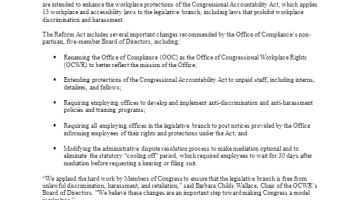The Congressional Accountability Act of 1995 Reform Act, which was passed by unanimous consent in the Senate and the House of Representatives, was signed into law by the President last night. The reforms are intended to enhance the workplace protections of the Congressional Accountability Act, which applies 13 workplace and accessibility laws to the legislative branch, including laws that prohibit workplace discrimination and harassment.
The Reform Act includes several important changes recommended by the Office of Compliance’s nonpartisan, five-member Board of Directors, including:
- Renaming the Office of Compliance (OOC) as the Office of Congressional Workplace Rights (OCWR) to better reflect the mission of the Office;
- Extending protections of the Congressional Accountability Act to unpaid staff, including interns, detailees, and fellows;
- Requiring employing offices to develop and implement anti-discrimination and anti-harassment policies and training programs;
- Requiring all employing offices in the legislative branch to post notices provided by the Office informing employees of their rights and protections under the Act; and
- Modifying the administrative dispute resolution process to make mediation optional and to eliminate the statutory “cooling off” period, which required employees to wait for 30 days after mediation before requesting a hearing or filing suit.
“We applaud the hard work by Members of Congress to ensure that the legislative branch is free from unlawful discrimination, harassment, and retaliation,” said Barbara Childs Wallace, Chair of the OCWR’s Board of Directors. “We believe these changes are an important step toward making Congress a model workplace.”
The Reform Act (S. 3749) passed in both the Senate and House of Representatives by unanimous consent on December 13, 2018. Most changes in the Act take effect 180 days after enactment. Procedures and timelines will not change for employees with claims filed prior to the effective date of the Reform Act.
“The Reform Act underscores Congress’s commitment to changing the workplace culture,” said OCWR Executive Director Susan Tsui Grundmann. “The OCWR looks forward to working with all of its stakeholders to accomplish the important goals of this reform.”

